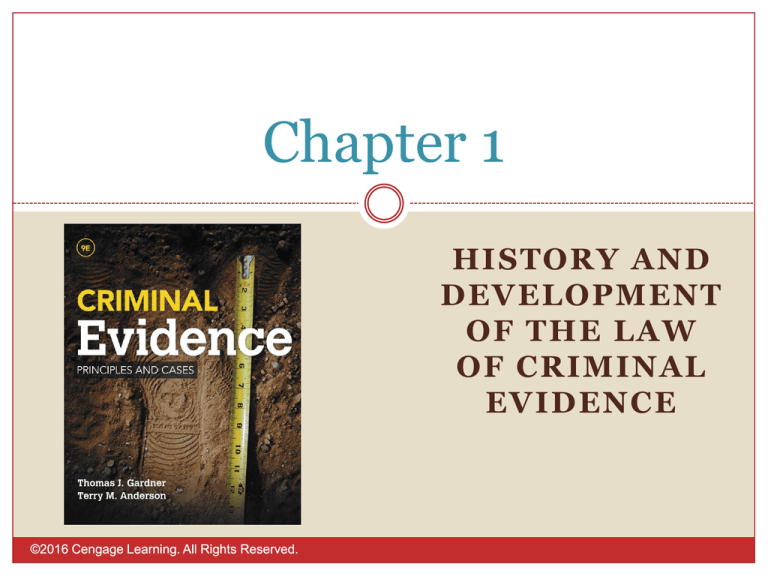
Chapter 1
HISTORY AND
DEVELOPMENT
OF THE LAW
OF CRIMINAL
EVIDENCE
©2016 Cengage Learning. All Rights Reserved.
Learning Objectives
Explain the importance of the Magna Carta.
Explain the function of the writ of habeas
corpus.
Identify how the U.S. Supreme Court made
the Bill of Rights applicable in state court
criminal cases.
List the rights identified and made available
to a criminal defendant under the U.S.
Constitution.
©2016 Cengage Learning. All Rights Reserved.
Evidentiary Rules
Gates through which evidence flows in our
criminal court system.
Most have their origins in English law.
Important to safeguard rights of accused
persons in a fair trial and to ensure the
interests of the public in the proper
functioning of the criminal justice system.
©2016 Cengage Learning. All Rights Reserved.
Early Methods of Determining
Guilt or Innocence
Use of ordeals was common; e.g., duels in
which winners were considered innocent
and losers were guilty.
Later, judgment was often pronounced by
the clergy through oaths and oath-helpers
(similar to witnesses today).
Presentment
juries composed of community
residents were also used.
©2016 Cengage Learning. All Rights Reserved.
Early Methods of Determining
Guilt or Innocence
Petit juries were charged with not only
determining guilt or innocence but also with
finding facts about this determination.
Rules were gradually developed to govern
the introduction of facts into criminal trials.
©2016 Cengage Learning. All Rights Reserved.
Witchcraft as a Crime
Numerous trials charging witchcraft as a
crime were held in ancient Rome and later
in Europe.
In Salem, Massachusetts witchcraft trials
were conducted and people were executed
and imprisoned.
The crime of witchcraft no longer exists in
the American criminal justice system and
can never be resurrected.
©2016 Cengage Learning. All Rights Reserved.
Magna Carta
Established minimum standards for
arresting and imprisoning individuals
accused of crimes.
Required a demonstration of probable
cause before a person can be arrested or
held in custody.
This principle influenced the drafters of the
American Declaration of Independence.
©2016 Cengage Learning. All Rights Reserved.
Writ of Habeas Corpus
This writ serves as a safeguard against
unlawful imprisonment.
The writ requires that an official must
present himself to a court to show cause for
holding a person in custody.
The right of habeas corpus is incorporated
into the U.S. Constitution in ARTICLE I,
SECTION 9.
©2016 Cengage Learning. All Rights Reserved.
Writ of Habeas Corpus
Habeas corpus writs provide another form of
review in criminal convictions and sentences
in addition to the appeal process.
28
U.S.C. § 2254 and 28 U.S.C. § 2255
authorize federal and state courts to hear
petitions for habeas corpus.
The petitioner must show the normal appeal
process has been exhausted.
©2016 Cengage Learning. All Rights Reserved.
Habeas Petitions
Prior to 1996, federal courts heard habeas
petitions under “de novo” review which gave
little deference to state court decisions.
Since 1996, writs are limited to cases where
the conviction or sentence was contrary to a
clearly established federal law or based on
“unreasonable determination of the facts.”
©2016 Cengage Learning. All Rights Reserved.
Affected review of habeas
Cullen v.
Pinholster
131 S. Ct.
1388 (2011)
petitions by federal courts.
Ninth Circuit Court of Appeals
agreed with petitioner’s claim
that his conviction and death
sentence were flawed because
his mental condition was not
taken into account.
U.S. Supreme Court reversed,
holding that evidence presented
at a habeas hearing could not be
considered.
©2016 Cengage Learning. All Rights Reserved.
Illustrates limitations to habeas
Thaler v.
Haynes
130 S. Ct. 1171
(2010)
petitions.
The Federal Circuit Court of
Appeals, which overturned a
Texas homicide conviction, was
reversed by the Supreme Court
because the appellate court
applied a legal principle that had
not be clearly established by the
Supreme Court.
©2016 Cengage Learning. All Rights Reserved.
Habeas Corpus and Enemy Combatants
Enemy combatants at Guantanamo Naval
Base in Cuba have appealed their detention
using habeas petitions.
In 2006, the U.S. Supreme Court held that
detainees on U.S. military bases had habeas
corpus rights.
Suspected
enemy combatants can be tried in
military tribunals as opposed to federal district
court.
©2016 Cengage Learning. All Rights Reserved.
The American Declaration of Independence
British abuses abounded in the colonies
prior to the creation and signing of the
Declaration.
Many of these abuses concerned liberty,
freedom, and the judiciary.
Eventually many of these abuses were
specifically corrected in the U.S.
Constitution.
©2016 Cengage Learning. All Rights Reserved.
The American Declaration of Independence
In declaring independence from Great
Britain, this U.S. document repudiated the
doctrine of the divine right of kings.
Declared
that governments derive power from
the consent of the governed.
Stated
that all men are created equal and
“endowed with the rights of life, liberty, and the
pursuit of happiness.”
©2016 Cengage Learning. All Rights Reserved.
The U.S. Constitution
The delegates sought to write a Constitution
which supported the new American
democracy and would create a practical
government to serve the people.
The
concepts of habeas corpus and the right to a
trial by jury were incorporated.
Bills of attainder and ex post facto laws were
prohibited.
©2016 Cengage Learning. All Rights Reserved.
The Bill of Rights
The first ten Amendments to the
Constitution were added to “embody certain
guarantees and immunities which were
inherited from our English ancestors.”
Originally,
these rights were applicable only to
the federal government.
The U.S. Supreme Court, through the Fourteenth
Amendment, applied these rights to the states.
©2016 Cengage Learning. All Rights Reserved.
Fifth and Sixth Amendments
Individual rights in criminal prosecution are
present in various parts of the Constitution
and the Bill of Rights.
The
Fifth and Sixth Amendments provide an
extensive list of those rights.
©2016 Cengage Learning. All Rights Reserved.
Fifth Amendment
Protects the accused from:
detention
without a presentment or indictment
by a grand jury;
double jeopardy;
self-incrimination; and
deprivation of life, liberty, or property without
due process.
©2016 Cengage Learning. All Rights Reserved.
Sixth Amendment
Provides the accused with the right to:
a
fair, speedy and public trial;
an impartial jury;
information about the nature and cause of the
accusation;
the ability to confront and cross-examine
witnesses; and
counsel for assistance in defense.
©2016 Cengage Learning. All Rights Reserved.
Innocence Until Proven Guilty
In a criminal prosecution, the accused is
considered innocent until proven guilty
beyond a reasonable doubt.
In
Taylor (1978) and Pagano (2002), the courts
have consistently held the accused is innocent
until proven guilty.
The U.S. Supreme Court has ruled that the
defendant’s presumption of innocence
is a basic component of a fair trial.
©2016 Cengage Learning. All Rights Reserved.
Public and Speedy Trial
The Sixth Amendment provides that “the
accused shall enjoy the right to a speedy and
public trial.”
A
public trial means all court sessions must be
open to the public unless the trial court gives
sufficient, specific reasons for closing the
courtroom.
©2016 Cengage Learning. All Rights Reserved.
The Promptness Rule
Suspects arrested without warrant must be
given a probable-cause hearing within 48
hours of arrest.
Further delay requires the government to
demonstrate why the circumstances could
not be avoided.
Sanctions
may include preclusion of evidence
collected during the delay.
©2016 Cengage Learning. All Rights Reserved.
Pursuant to the Sixth
Presley
v.
Georgia
130 S. Ct. 721
(2010)
Amendment the accused shall
enjoy the right to a speedy and
public trial.
The Presley court held that
“public trial” includes the voir
dire (juror examination) portion
of a trial.
Closing the courtroom to the
public requires the trial court to
provide “sufficient” reasons or to
consider alternatives.
©2016 Cengage Learning. All Rights Reserved.
The Right to a Speedy Trial
The Sixth Amendment includes granting
the defendant a speedy trial.
Courts
are split as to whether this applies in
situations where sentencing is delayed.
A defendant may waive the right to a speedy
trial with permission of the court.
The
federal government and many states have
enacted statutes that prescribe the time limit
within which a case must go to trial.
©2016 Cengage Learning. All Rights Reserved.
Right to an Indictment
About half of the states follow the Fifth
Amendment requirement of a grand jury
indictment for capital or “infamous” crimes.
In other states, elected prosecutors
determine whether to charge a defendant
and what crimes to charge.
Defendants
charged with a felony by a prosecutor
have the right to a preliminary hearing.
©2016 Cengage Learning. All Rights Reserved.
Right to a Fair (Not Perfect) Trial
Under the Due Process clauses of the Fifth
and Fourteenth Amendments, the law does
“not require a defendant receive a perfect
trial, only a fair one.”
If
a defendant is convicted in a trial where a
harmless error occurred, the defendant is not
entitled to a new trial.
If
an error during the trial is deemed harmful,
reversible, or plain, the defendant is entitled to a
new trial or to have the charges dropped.
©2016 Cengage Learning. All Rights Reserved.
Right to Assistance of Counsel
If charged with a crime, a person has the
Sixth Amendment right to counsel.
If
the defendant cannot afford an attorney, one
will be provided by the state or federal
government.
The right to effective counsel applies at all
stages of a criminal prosecution.
©2016 Cengage Learning. All Rights Reserved.
Strickland
v.
Washington
466 U.S. 668,
104 S. Ct.
2052 (1984)
A convicted defendant claiming
inadequate or ineffective defense
must prove:
the
defense fell below an
objective standard of
reasonableness; and
a
©2016 Cengage Learning. All Rights Reserved.
reasonable probability exists
that the results would have been
different but for the lawyer’s
errors.
Right to Be Informed of Charges
The Sixth Amendment provides that “the
accused shall enjoy the right … to be
informed of the nature and cause of the
accusation.”
Can
be an issue when a defendant later seeks to
retract a guilty plea because it was not “voluntary
and intelligent.”
©2016 Cengage Learning. All Rights Reserved.
A defendant’s guilty plea must
Bousley
v. United
States
523 U.S. 614
(1998)
be “voluntarily and intelligently”
made in order to be
constitutionally valid.
If circumstances show that the
defendant was misinformed by
either the court or the
prosecutor, the guilty plea is
invalid.
©2016 Cengage Learning. All Rights Reserved.
Right to Compel Witnesses
The Sixth Amendment provides that “the
accused shall enjoy the right … to have
compulsory process for obtaining witnesses
in his favor.”
Witnesses
can be compelled to appear through
the use of subpoenas.
©2016 Cengage Learning. All Rights Reserved.
Right to Testify or Not Testify
It is the defendant’s choice whether to testify
in his or her own defense.
Most defendants do not testify, for a variety
of tactical reasons.
A
defendant who testifies is subject to crossexamination.
Many
defense lawyers want to avoid this risk.
©2016 Cengage Learning. All Rights Reserved.
Right to Confront Witnesses
The Sixth Amendment provides that “the
accused shall enjoy the right … to be
confronted with the witnesses against him.”
The
famous trial of Sir Walter Raleigh in 1603
was one of the reasons the Confrontation Clause
was included in the Sixth Amendment.
©2016 Cengage Learning. All Rights Reserved.
Freedom from Unreasonable
Searches and Seizures
The Fourth Amendment forbids searches
without a warrant unless a justifiable
exception can be shown.
The historic foundation for the Fourth
Amendment can be traced back to the
Magna Carta and the probable cause
requirement.
©2016 Cengage Learning. All Rights Reserved.
Right to an Impartial Jury
This right is guaranteed by the Sixth
Amendment.
Juror challenges, either for cause or
peremptory, are designed to help ensure an
impartial jury.
Excusing jurors for cause has been an issue
in death penalty cases.
©2016 Cengage Learning. All Rights Reserved.
U.S. Supreme Court identified
Uttecht
v. Brown
127 S. Ct.
2218 (2007)
©2016 Cengage Learning. All Rights Reserved.
four principles that must be
used to determine if a juror has
been properly excused for
cause in capital cases:
1. The prosecution may not
challenge for cause any juror
who expresses doubt about
capital punishment.
2. The state has a legitimate
interest in having jurors who
are willing to apply capital
punishment where the law so
permits.
Uttecht v.
Brown, cont.
3. Unless a juror is “substantially
impaired” in his or her ability to
impose the death sentence, the
juror’s excusal for cause is
improper.
4. The trial judge is entitled to
deference in the determination of
when a prospective juror is
“substantially impaired.”
©2016 Cengage Learning. All Rights Reserved.
Peremptory Challenges and Discrimination
During jury selection, both sides are given
peremptory challenges to exclude potential
jurors from being selected. Both sides are
also given unlimited challenges for cause.
Preemptory challenges are determined by
state law and are not required by the U.S.
Constitution.
©2016 Cengage Learning. All Rights Reserved.
Peremptory Challenges and Discrimination
Both parties are generally entitled to strike
any prospective juror for cause.
They
may also strike a limited number of
potential jury members without having to explain
the reasons, called a “peremptory challenge.”
The peremptory challenge can be used to
exclude potential jurors who might be
reluctant to find the defendant guilty.
©2016 Cengage Learning. All Rights Reserved.
Prohibited the use of
Batson v.
Kentucky
476 U.S. 79
(1986)
peremptory challenges to
exclude jurors based on race of
juror.
Prosecution needs “race-neutral”
reasons to justify the challenges
during jury selection.
The U.S. Supreme Court has not
extended the Batson holding to
include peremptory strikes
based on other factors such as
religion.
©2016 Cengage Learning. All Rights Reserved.
The Right of a Defendant to be
Present During Trial
Common law principles mandate a
defendant has the right to be present during
his criminal trial and cannot be trial in
absentia.
The Supreme Court has held that federal
rules require that in felony cases the
defendant must be present at the beginning
of the trial.
©2016 Cengage Learning. All Rights Reserved.
Crosby
v. United
States
506 U.S. 255
(1993)
Court held that Rule 43 of
the Federal Rules of
Criminal Procedure requires
a defendant be present at
the beginning of any felony
criminal trial, forbidding in
absentia trials for
defendants who were not
“initially present.”
©2016 Cengage Learning. All Rights Reserved.





